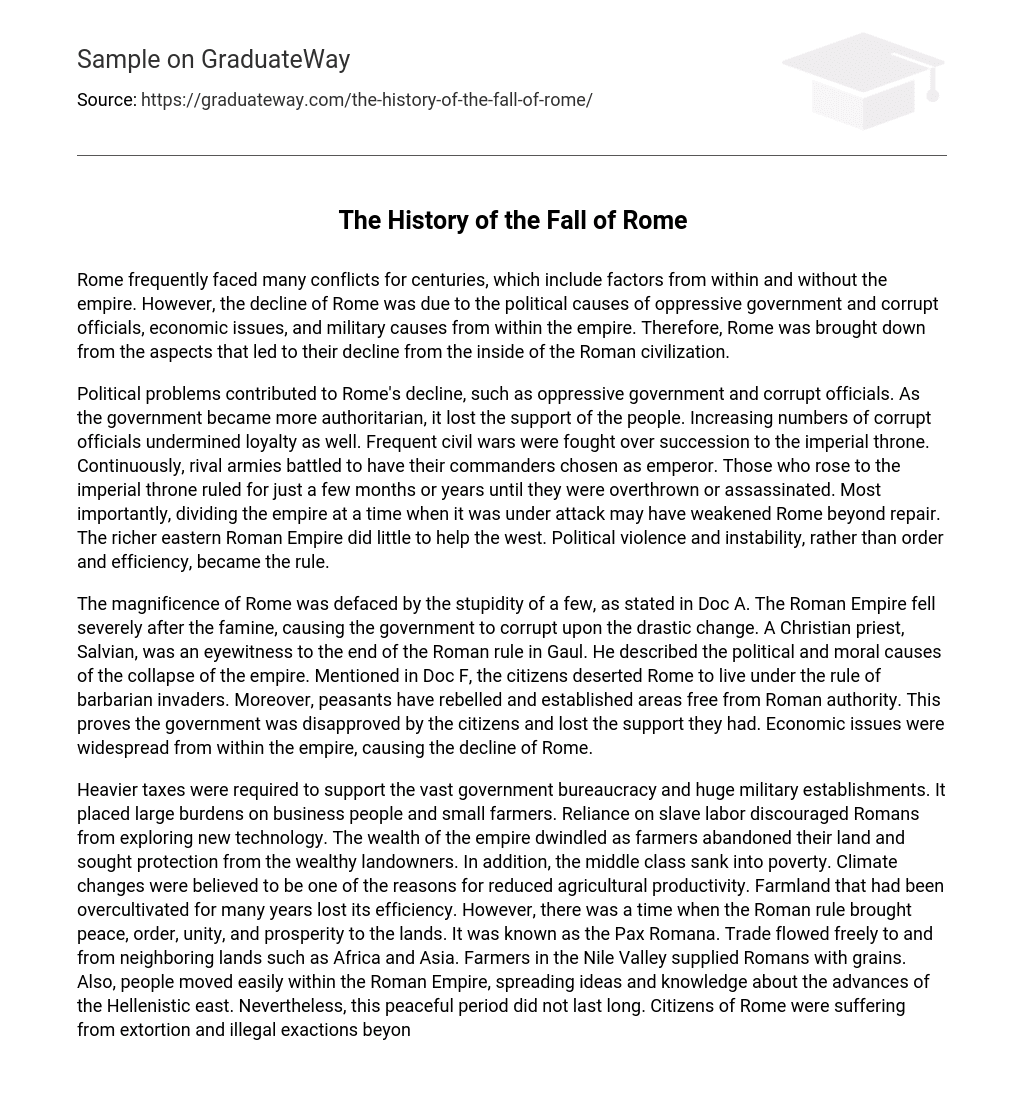Rome experienced ongoing conflicts for centuries, both internal and external. However, the Roman Empire’s downfall can be attributed to political factors such as oppressive governance and corruption within government officials, economic problems, and internal military causes. In essence, the decline of Rome originated from within the Roman civilization itself.
Rome’s decline was contributed to by political problems, including oppressive government and corrupt officials. The government’s increasing authoritarianism led to a loss of support from the people, while the presence of more corrupt officials undermined loyalty. Civil wars were frequently fought over the succession to the imperial throne, with rival armies battling for their commanders to become emperor. Those who managed to rise to the imperial throne typically only ruled for a short period before being overthrown or assassinated. Moreover, dividing the empire during times of attack potentially weakened Rome irreparably. The richer eastern Roman Empire offered little assistance to the west, thereby allowing political violence and instability to become the norm, rather than order and efficiency.
According to Doc A, a few individuals’ stupidity marred the majesty of Rome, leading to the severe downfall of the Roman Empire. This decline was further exacerbated by a famine, resulting in corruption within the government due to the significant changes experienced. An account from Christian priest Salvian, as mentioned in Doc F, describes how the political and moral factors culminated in the collapse of Roman rule in Gaul. As evidenced by citizens abandoning Rome to live under the control of barbarian invaders and the rebellion of peasants who established independent domains, it becomes clear that the government lost support and faced disapproval from its people. Economic troubles were widespread throughout the empire, ultimately contributing to Rome’s decline.
Heavier taxes were necessary to support the extensive government bureaucracy and large military establishments. This placed significant burdens on business people and small farmers. The use of slave labor discouraged Romans from exploring new technology. The wealth of the empire declined as farmers abandoned their land and sought protection from wealthy landowners. Additionally, the middle class fell into poverty. Climate changes were thought to be one of the causes of reduced agricultural productivity. Farmland that had been overcultivated for many years lost its efficiency. However, there was a time known as the Pax Romana when Roman rule brought peace, order, unity, and prosperity to the lands. Trade freely flowed between neighboring lands such as Africa and Asia. Farmers in the Nile Valley supplied Romans with grains. People also easily traveled within the Roman Empire, spreading ideas and knowledge about the advances of the Hellenistic east. However, this peaceful period was short-lived. Roman citizens suffered from extortion and illegal exactions by those who should have protected public welfare, as stated in Doc C. Military commanders, soldiers, and influential men in the city took Romans away from their work.
As a result, the Romans experienced significant injustice, which had a negative impact on their economy. The peasants were particularly affected as they did not receive government assistance. Additionally, according to Doc D, the imperial office desperately needed money to pay the soldiers and maintain the state, leading officials to exploit the middle class. Doc B further highlighted that the government had to allocate funds for soldiers and war supplies. This resulted in wealthy citizens being forced to increase their tax payments. As a result, Romans could go from being wealthy one day to becoming paupers the next. The government prioritized the military, which incited feelings of hatred and rebellion among the Romans. Doc H described how Roman cities were destroyed, leading to a decline in the empire. Fortifications were demolished, fields were devastated, and lands were left deserted.
The decline of the Roman Empire can be attributed, in part, to military causes. The empire was weakened from within by invasions from foreign countries, as well as a lack of discipline and training in the late Roman legions. The dwindling population of Rome further contributed to its downfall. The battle of Adrianople in Doc E highlighted Rome’s inability to defend its borders, resulting in the loss of control over that area. The fate of Rome depended on the outcome of battles, but they were not always victorious. As stated in Doc G, the Visigoths accepted a large ransom to end their siege on Rome, indicating the empire’s vulnerability. The continuous attacks from other countries further weakened the Romans and ultimately led to the decline of their civilization.
The decline of Rome was attributed to various internal factors, including oppressive government and corrupt officials, economic difficulties, and military causes. These problems arose within the empire and ultimately led to the destruction of Rome. The decline of Roman greatness was marked by the loss of citizens, widespread afflictions, attacks by enemies, and the frequent collapse of buildings. Present-day countries also encounter similar challenges that may contribute to their decline, as they continue to grapple with political, economic, and military issues.





